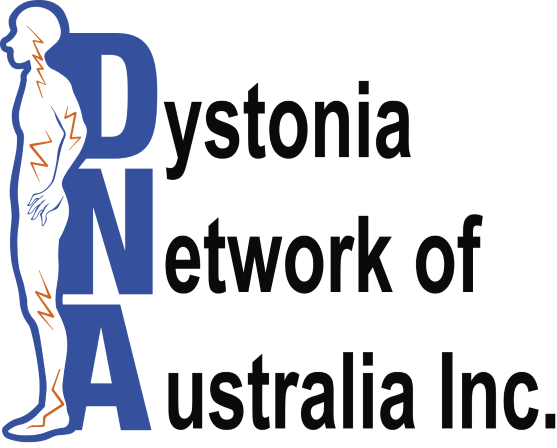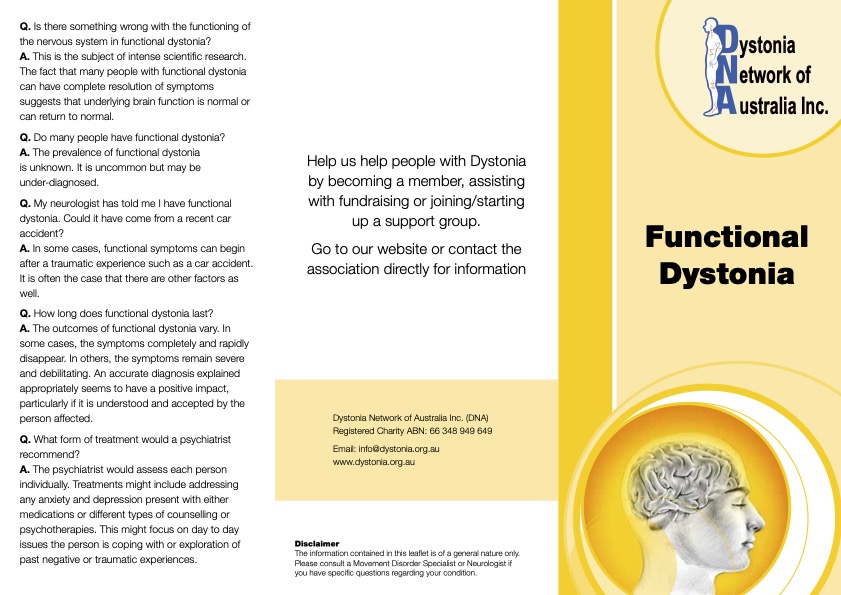What is functional dystonia?
Functional dystonia refers to a condition with symptoms similar to dystonia but which are due to underlying psychological factors rather than a brain disease. Functional dystonia is sometimes referred to by other terms, including psychogenic dystonia. The cause of functional dystonia seems to be subconscious, where the person is not aware that the symptoms may be under voluntary control. The features of functional dystonia can be similar to other causes of dystonia, including abnormal postures of any part of the body, either fixed in one position or occurring from time to time and varying in severity. In some cases, functional dystonia can be a form of “conversion disorder”, where the physical symptoms are triggered by a psychological trauma.
How is functional dystonia diagnosed?
Diagnosis is based mainly on the clinical judgement of the specialist neurologist, as with most forms of dystonia. Where possible, positive clinical diagnostic criteria are used by the neurologist to reach the diagnosis of functional dystonia. It is important for this reason that the neurologist has a wide knowledge of, and experience with, many forms of dystonia. Early diagnosis means that the correct treatment can begin and is crucial in preventing ongoing frustration for the patient. Specialised tests including recordings of muscle and brain activity may be helpful in some situations. Functional dystonia can take many forms. One of the most common is ‘fixed dystonia’ which is often associated with severe pain and sometimes swelling. The diagnosis of functional dystonia should be made by a neurologist who has specialist knowledge in this area. Some patients report that they have never been less stressed and therefore feel that the dystonia cannot be functional. However, functional dystonia can occur with or without psychological symptoms. Furthermore, other forms of dystonia are often accompanied by psychological symptoms such as anxiety and depression.
The psychiatrist has an important role to play in assessing the person’s psychological state. If a psychological cause is identified, addressing this can cure the functional dystonia. However, it is common that no psychological cause can be identified, even after review by a psychiatrist experienced in the field. In some cases, a definite neurological diagnosis of functional dystonia and subsequent discussions can improve or even cure functional dystonia but psychiatric review is still recommended to help to reduce the chance of symptom recurrence. Early diagnosis and an openness to consider the diagnosis of a psychological cause, play an important role in managing the condition.
How is functional dystonia treated?
A multidisciplinary rehabilitation approach can sometimes be highly effective. This includes a team of health professionals experienced in helping people with psychogenic symptoms working together to look for strategies to control and overcome the dystonia. Other than the specialist neurologist and psychiatrist the team may include rehabilitation specialists, physiotherapists, occupational therapists and speech therapists. Others, such as a pain specialist, may also have a role, depending on the nature of the symptoms.
What is the long term outlook?
How the person is given the diagnosis is important, to ensure that the person understands the diagnosis and the treatment offered. This must be delivered in a sensitive, non-judgemental way with a clear outline of treatment options that works towards managing or treating the symptoms. It is important that the person understands the diagnosis to avoid unnecessary repetition of tests, hospital admissions and further physical and emotional distress. With acceptance of the diagnosis and treatment, many patients can experience a complete recovery.
FAQs
Q. If there is no test for dystonia except for the genetic types, and it doesn’t show up in an MRI, does this mean that most people with dystonia have functional dystonia?
A. Dystonia does not have any obvious abnormalities of brain structure unless it is secondary to another neurological condition such as traumatic brain injury. The term functional dystonia has the advantage of suggesting a likely cause for the symptoms and allows separation of functional dystonia from idiopathic dystonia (where the cause is yet to be defined).
Q. Is there something wrong with the functioning of the nervous system in psychogenic dystonia?
A. This is the subject of intense scientific research. The fact that many people with functional dystonia can have complete resolution of symptoms suggests the underlying brain function is or can return to normal.
Q. Do many people have functional dystonia?
A. The prevalence of functional dystonia is unknown. It is uncommon but may be under-diagnosed.
Q. My neurologist has told me I have functional dystonia. Could it have come from a recent car accident?
A. In some cases, functional symptoms can begin after a traumatic experience such as a car accident. It is often the case that there are other factors as well.
Q. How long does functional dystonia last?
A. The outcomes of functional dystonia vary. In some cases, the symptoms completely and rapidly disappear. In others, the symptoms remain severe and debilitating. An accurate diagnosis explained appropriately seems to have a positive impact, particularly if it is understood and accepted by the person affected.
Q. What form of treatment would a psychiatrist recommend?
A. The psychiatrist would assess each person individually. Treatments might include addressing any anxiety and depression present with either medications or different types of counselling or psychotherapies. This might focus on day to day issues the person is coping with or exploration of past negative or traumatic experiences.
Download Brochure
Brochure – Functional Dystonia
Not a member? Join today to assist us to continue to provide resources.
Disclaimer: The information contained on this page is of a general nature only. Please consult a Movement Disorders specialist or neurologist if you have specific questions regarding your condition.
Page reviewed 31 January 2024





